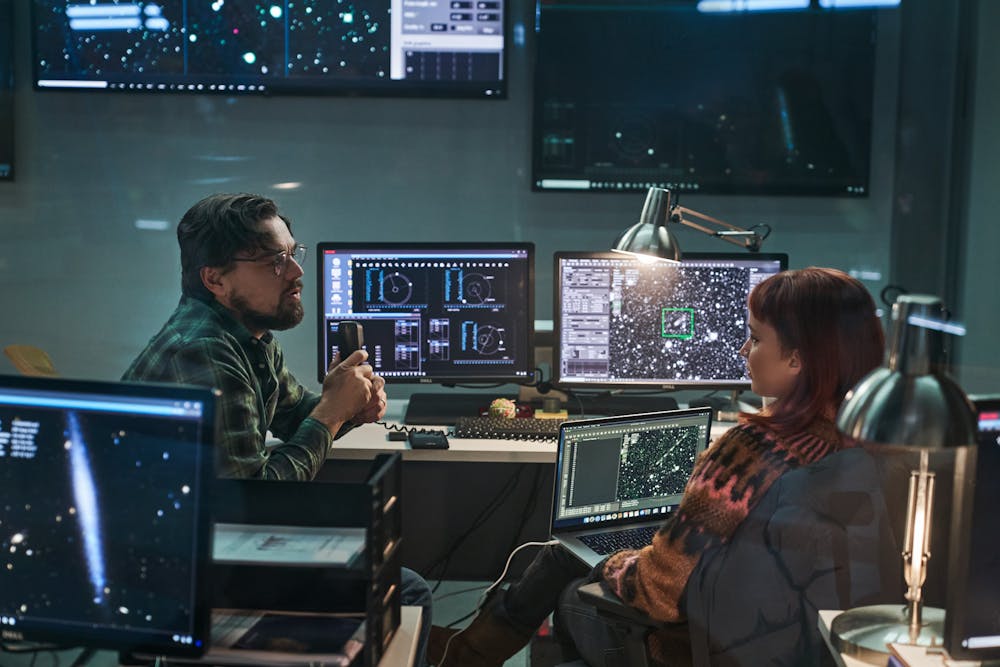By Lea Pichardo
Staff Writer
When I first watched Adam Mckay’s newest film “Don’t Look Up,” which centers around a planet-destroying comet and serves as a cautionary tale in regards to climate change, I had conflicted feelings about it.
Even as an avid supporter of legislation and practices that support sustainable living, I rejected the film’s tone of anger and hopelessness. I was at a point in my life where I had just been informed that there was no end in sight for a global pandemic that had, in more ways than one, ravaged my sense of normalcy. I was in no mood to watch a film about the end of the world, much less write a review about it. I wanted a positive film: one that made me laugh and smile, or at the very least, one that introduced hope into the narrative. I wanted someone to come on the screen and say, “Things may look dire now, but everything is going to be okay. You will prevail. We all will prevail.”
Unfortunately, that was not the case.
In the film, two astronomers discover the comet, Michigan State Ph.D. candidate Kate Dibiasky (Jennifer Lawrence) and her professor, Dr. Randall Mindy (Leonardo DiCaprio). They do everything they can to educate the public about the impending strike, the resulting consequences and implications. They hand out flyers, go on a famous daytime talk show, start a social media campaign, work with an accredited and reputable scientist to figure out how to prevent the comet from hitting Earth, and then present those solutions to the president of the United States and her chief of staff — played by Meryl Streep and Jonah Hill, respectively. However, the astronomers are ridiculed, silenced and ignored. In the end, none of their efforts are enough.
There is no arc of redemption or sudden vigor to turn things around. There are no last-minute solutions or knights in shining armor who come in on a horse, wielding a sword, determined to save the day. The narrative isn’t bright or even remotely hopeful and it doesn’t emphasize the true power of unity in a time of despair and tragedy. So when the credits started rolling, I struggled to find meaning. I struggled to find a sense of purpose or even a sign that moving forward was worth it.
But time went on, as time does and eventually, I was able to remind myself that the world had not ended, at least not yet. This means that we have more time. Perhaps limited time, but more time, nonetheless. At the end of the day, “Don’t Look Up” was never a declaration that we have run completely out of time nor was it an assertion that at this point in time, there is nothing that can be done. Real change is not a myth or a joke that one can meekly laugh at in the moments before death. It is still a very real possibility, even now, when it feels like the world is falling apart at the seams and keeping our heads above water feels like a struggle.
It is still achievable.
“Don’t Look Up” has made plenty of meritorious arguments that do not solely relate to climate change. It would be unjust, or at the very least, incredibly unwise to overlook them.
For example, there are many compelling points about the nature of unity. When faced with news of an impending comet strike, no one in the film cares. The public is generally portrayed as excessively self-interested and apathetic. Even in the face of death, human beings fail to unite around a basic and universal desire to survive. Moreover, discourse about the comet becomes politicized. Picking a side and having a certain belief is portrayed as something infinitely more important to the general public, and to our leaders, than teamwork, cooperation, support, respect and civility.
Needless to say, a distinct lack of unity can be a very dangerous thing, but I appreciate that the film emphasized that lesson. Mostly, because it is a distressingly easy lesson to forget and because it applies to every single hardship we face, as individuals, as a community, as a society and as a nation. And also because the points made about the distinct lack of teamwork in the face of tragedy can spark a discussion about whether our communal, societal, national and universal values are under attack, and in danger of being, not only undermined but destroyed completely.
The film certainly isn’t without its flaws. I didn’t find the movie to be significantly funny in any way, nor did I believe that the cast of A-list actors made the film any more or less impactful than it would have been otherwise. The editing used in the film wasn’t the best. In some scenes, actors were often cut off mid-sentence, and in others, the viewers would only just become comfortable in one place or one emotion, only to be cut to a new scene without a reasonable transition. I understand that the effect was meant to be jarring and abrupt. “Don’t Look Up,” after all, was not meant to be comforting. Even so, I felt that it detracted from the quality of the movie as a whole and took attention away from the message at hand.
But, like other influential forms of art, this film has the potential to lead to real tangible change.
At least, that is what I would like to believe.







